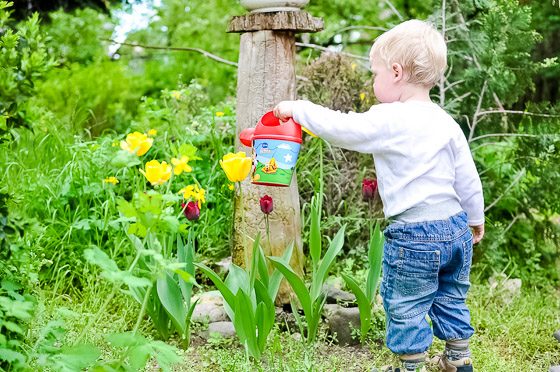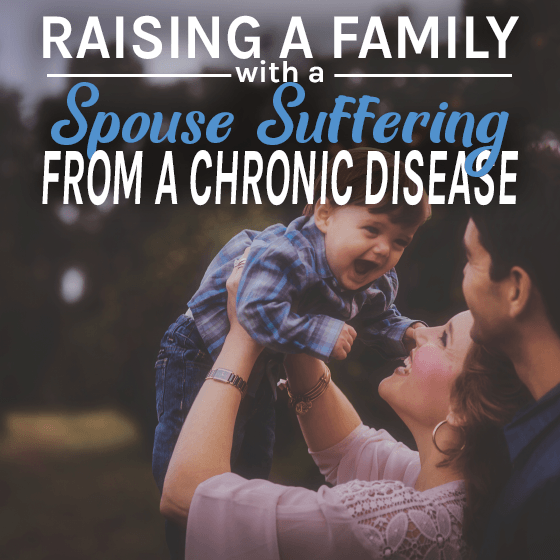As I sat breastfeeding my infant while entertaining my toddler, half-listening to a doctor (a gastroenterologist to be exact) tell myself and my husband that he was being diagnosed with Crohn’s Disease, I was overwhelmed to say the least. This made no sense. How was my 29 year old, strong, healthy, weight lifting, food-loving husband being diagnosed with a disease neither of us had ever heard of? A disease that in the middle of a cold night in January 2012 crippled my husband, sent him to the hospital, and resulted in him being admitted for over a week. A disease that would change the course of our lives forever.
Immediately I began to research Crohn’s disease and what our medical options were. Disbelief soon led to anger and eventually acceptance. Although we were hoping this was a one-time occurrence, my husband began to have regular “flare ups” like clockwork every 90 days. As anyone who lives with a spouse or partner who sufferers from a chronic illness or disease can tell you, this became a huge part of our lives. According to the Center for Disease Control and Prevention, over 117 million people are suffering from at least one chronic disease; the National Institutes of Health list 23.5 million Americans as suffering from autoimmune conditions.

Diets changed, lifestyles changed, and we changed, but at the end of the day we are still just two people, parents, working to make ends meet and raise the best little people we can. It was unexpected and it is something we worry about, but have become accustomed to… and it is not all bad. Here are some tips for living with a spouse with a chronic illness.
1. Stop being angry and accept their limitations.
Acceptance is probably the most difficult thing for someone thrust into this situation. When disease unexpectedly affects a family in any way, shape, or form oftentimes people become eternally angry with the “It’s not fair” scenario running rampant through their head. It takes serious effort for most people to stop this continuous stream of negativity and be able to focus on the great parts of their lives.
Along with letting go of the anger comes the necessity of accepting your partner’s limitations. Like it or not, you cannot blame your spouse or partner for having a disease or autoimmune condition that they have no control over. You cannot blame your partner because his or her body refuses to perform like I guarantee you he or she so seriously wishes it would. “For better or worse, in sickness and in health…” you have to learn to accept that person you love for who he is now including what he can (and cannot) do.

One of the symptoms of many chronic or autoimmune diseases is fatigue, which takes some getting used to for everyone in the family. The fatigue can be frustrating for the adults and children when the affected person is simply tired all the time. Chronic fatigue is not something we as exhausted mothers can relate too; it is a bone-deep exhaustion that cannot be powered through or cured with a big cup of joe. In coping with a spouse with an illness you have to learn to accept the symptoms and adjust accordingly. Let them take naps, let them sleep in, let them come home from work early to rest and relax with a little quiet time before the evening chaos that ensues in every household. Accept that the person you married is not deliberately making more work for you, but rather doing the best they can. You will have to make choices and you will soon realize that you would rather your spouse expend what little extra energy he or she may have with your little people being the best parent they can rather than doing dishes or taking out the trash.
2. Take on the Lion’s share of the household responsibilities.
Dishes, laundry, chauffeur service to piano, gymnastics, school, birthday parties, and soccer… you may never stop moving. There probably will not be an equal division of labor in your household. You may even be working two jobs, one outside of the home and one inside. Although many moms would probably commiserate and say the same thing, when you have a spouse with a chronic illness you have to take on the lion’s share of the household tasks. A partner suffering from a chronic illness or autoimmune condition may not be sleeping in and napping frequently because he wants to but because without the extra rest his or her health will decline.

And the kids can help… I am a Montessori mom, so doing the dishes, cooking, and gardening that need to be done are not really chores to children, rather they are educational opportunities that kids actually enjoy doing. Young children love to do chores, so although you may have to do more than your spouse and although these tasks may take longer with the kid’s help, you will still be spending time together and working on tasks and skills that kids not only need to learn, but enjoy. They love measuring ingredients and cracking eggs when cooking, they enjoy sorting laundry by color and competing with each other to see who can fold towels the fastest. And of course gardening and outdoor tasks take the cake as most children love to search for rocks, sticks, shells, frogs, lizards, and bugs while weeding the garden, trimming tree branches, or raking leaves. Taking on all of these responsibilities is not really a chore, it is simply more time for bonding with your children, seeing how quickly they learn, and being amazed at how competent and independent they really are.
3. Advocate for your Spouse and become involved in their treatment plan.
Because someone has to. You would do it for your child without question, so when your spouse is suffering from a chronic disease, advocate for him or her. Advocacy can take many forms, but when your spouse is diagnosed with a chronic illness you are going to be inundated with doctors and specialists, medications and alternative therapies, and in some cases diet and nutrition options; the information that comes your way is overwhelming, especially to the person newly diagnosed who is still trying to cope with the idea that they now have a disease, and probably still doesn’t feel very well or like him or herself. They need someone who will be in their corner, asking the right questions, challenging the doctors, and fighting with insurance if need be.

Learn about your spouse’s condition so you can talk through the medical and nutritional options with them. With my husband, we (and by that I really mean I) decided we were going to do this the natural way. After months of research on medications and side effects, diets and results, we decided to address my husband’s disease through natural practices (at least for now). But that wasn’t without push back from doctors, meetings with naturopaths, and constant questioning of our choices by everyone we knew.
It is difficult for someone sick and afraid to make these decisions alone, so get involved. Part of my husband’s overall treatment plan was to heal with food, so from mayonnaise to yogurt, ketchup to ice cream, bone broth to bread and anything and everything in between, I cook. My husband does not eat “out food”, he does not eat anything commercially processed, and he cannot simply grab a quick snack when he’s hungry unless I have made sure all the food choices he’s allowed are available. Because I believe in his diet and because he has to be the one to stick to it, I cook (sometimes at 5:30 am because he needs lunch and I fell asleep the night before). Be an active participant in your spouse’s treatment because they are stressed enough trying to cope with the symptoms of their disease.
4. Accommodate them and include them.
When you are part of a family where one member suffers from a chronic illness or disease that either limits their activity or simply requires additional planning, people are not always sympathetic. It can pose challenges to planning family meals, outings, holidays, and vacations, but it is very possible. I come from a very large family having four brothers, aunts, uncles, cousins, and grandparents, and now significant others and grandchildren so anything we do requires extra effort anyway. My entire extended family has been so accommodating to my husband’s disease that it is no longer a factor that is even acknowledged in our planning, we just automatically account for it.

As with most chronic illnesses and diseases there are periods of remission, so when doing well, and usually only for special occasions, we will occasionally eat out. That said, there are very few places we can go. My family is accustomed to this and plans accordingly. Steakhouses and fresh fish markets are the go-to restaurants. Although my husband’s options on said menus are still extremely limited, he can still participate and be a part of the group. We will never head to an Italian Eatery or chain restaurant. While others may want pasta and bread sticks, those places are strictly off limits. Thanksgiving has become an “organic” affair and vacation homes require enough rooms for him to have some space if he isn’t feeling well (traveling with 15+ people regularly requires space anyway).
No matter what your spouse or partner’s diagnosis you need to be ready and willing to accommodate their needs because they are a part of your family. Family vacation isn’t family vacation when Mommy cannot go, Thanksgiving is not a family tradition when Daddy cannot eat, leaving your spouse out of family events makes them feel more isolated and ostracized than their disease has already done.
Oftentimes people seriously will ask “Can’t he just eat before we go?” or “Can’t you just leave her at home?” NO! A person struggling with a chronic disease does not need any more reason to feel socially excluded, and with very minimal effort he or she really can be included. And he or she really will appreciate it. If you are living with someone coping with a disease you likely often hear “It’s ok” and “I don’t mind” but psychologically this has an effect.

Social exclusion has been defined as ‘the process through which individuals or groups are wholly or partially excluded from full participating in the society within which they live.’ Individuals suffering from an already debilitating and isolating chronic disease or illness do not need to feel any more alone than they already do, especially not in the presence of their families and friends. Your spouse needs to know that you accept them and their disease as they are. For someone diagnosed with a chronic illness later in life it is just as tough to deal with the acceptance as those diagnosed younger. It is traumatic enough for the person being diagnosed to have to wonder what will happen as the disease progresses; they should not also have to worry about how this will affect their marriage and their family. Acceptance and accommodation allow your spouse to focus on what is most important which is keeping their health needs addressed so that he or she can be the best spouse and parent possible.
5. Take some time for yourself and Accept help.
Sometimes you just have to hire a babysitter. Sometimes you just have to get away. Not because of any one particular thing, but because running a household and raising little people, especially with an unwell spouse can be overwhelming and exhausting and exhilarating all at the same time. Go get your nails done, go get a massage, go to the grocery store alone and buy a bottle of wine. Go to a play or a movie or dinner with friends and talk about something other than kids, or housework, or your partner’s disease (Good Luck! You’ll be sitting in silence…). Take time to simply recuperate and relax a little because you are affected by this disease too. You may not have to suffer the physical symptoms of this illness but make no mistake you are impacted and your reality is likely different than what you expected.

And for goodness sake, allow others to help! You cannot do it all. I know you think you can because I did too, and I know you’ll still try but you will exhaust yourself rapidly and your spouse and little people need you. Trying to juggle all of this once you are burnt out does not benefit anyone as you will be snippy and short with the people you love most. Family and friends will offer to help whether taking the kids or assisting with meal preparations; accept the help from people in your corner who are trying to understand what you and your family are dealing with.
My mother is amazing at always making sure she has ingredients on hand to whip up a meal for my husband when I need a break, my father is his go to ride for doctors’ appointments or hospital visits, and my next-door neighbor is always willing to lend a hand around the house. My friends and even the parents of my children’s friends have been amazing at making sure there are homemade food choices for my husband at holiday gatherings and children’s birthday parties, and we always have a few extra dads willing to coach the soccer teams when my husband is down for the count due to a flare. Instead of always going it alone and isolating ourselves, we have accepted the kindness and compassion of others which has educated them about a chronic illness and has allowed us to lead a “normal” life. Let your family and friends in because I promise you they will be ready and willing to help out.
6. Appreciate that your children are learning invaluable life lessons from this experience.
Rather than worrying that your children are being negatively affected by your partner’s disease, focus on the lessons in kindness and empathy they are learning daily. Living with a chronically ill parent is not necessarily detrimental to a child’s development, but rather teaches the child responsibility and compassion. It teaches them to express concern for others, to help others, and to be accepting of others regardless of that person’s limitations.
I remember when my three year old came home from pre-school one day and told me in his most dramatic voice “Mommy, the new little boy at school has Crohn’s! He can’t eat cookies, or cupcakes, or pretzels like Daddy!” Now, it turns out the little boy did not have Crohn’s (thank goodness); he does however suffer from a very serious peanut allergy and cannot eat the same snacks as the other children at school. That said, his mother brings snacks (and lunch) specifically for him, but my son sits with him during snack time almost daily because he knows and understands that he cannot share his snack with the little boy and why. Although the school does not have a separate section during meal times for those with allergies because they feel a child should always be included (they assign a teacher to keep closer watch on specific children during mealtimes), the school knows my son is one who can sit next to the little boy because he understands and follows the rules regarding food sharing. He is safe, he gets it – at three years old. As a parent I am so proud of him every day for his inclusion of others which he does not even understand. It is not an effort for him, it is not a conscious decision to be made, because it is simply his way of life. From the time he can remember (he was my two month old) this is how we have lived our lives including, or really just not excluding his daddy.

Families come in all different shapes and sizes. There is no individual definition of “normal.” What works for your family may not be what works for another. The important thing is that you are doing what you need to do for your spouse, your children, and yourself. Keeping everyone safe, happy, and as healthy as possible, both physically and mentally, is the goal for all families regardless of whether you are living with disease. When feeling well, my husband coaches soccer and runs 5K’s and races with my boys, feeling well or not he plays chess with my oldest, piano with my middle and reads stacks of books to the littlest; he is an active and present dad always. The fact that he expends the energy he does have on playing with his boys rather than yard work is ok with me.
The disease does not have to define you or your family, it can be something that you think of fleetingly each day as you go about your daily tasks; it can become nothing more than a part of your routine. We eat a mainly paleo diet because of my husband but it is no longer an issue, it is simply how we eat. I don’t question it and I don’t miss things, it has become my normal. Letting my husband sleep in on weekends while the boys and I walk to the farmers market is again normal. There is nothing about our routine that indicates to the outside world that there is anything different about or negatively affecting our family because really there is not. Occasionally my husband’s disease flares and our routine is rattled, but situations arise in all households all the time that disrupt routine. Raising children in a family affected by a chronic disease does not have to define you, it does not have to set you apart, but, in a positive way, it just might.
At the end of the day, once you come to accept your spouse for who they are – strengths, weaknesses, sickness, and health – you are just two people doing the best you can to keep your children safe, happy, and healthy. So take that deep breath, let someone else make a meal, sit back for a minute, and reflect on all the good things you have to be thankful for in this life you have created with your love. As the ever popular words of Bob Marley have taught us, “Everything’s gonna be alright”, and at the end of the day you, your spouse, and your children are going to be stronger for it.
Photo Credits: Kristin dePaula, Ronda Wollard Originals, Pixabay











































